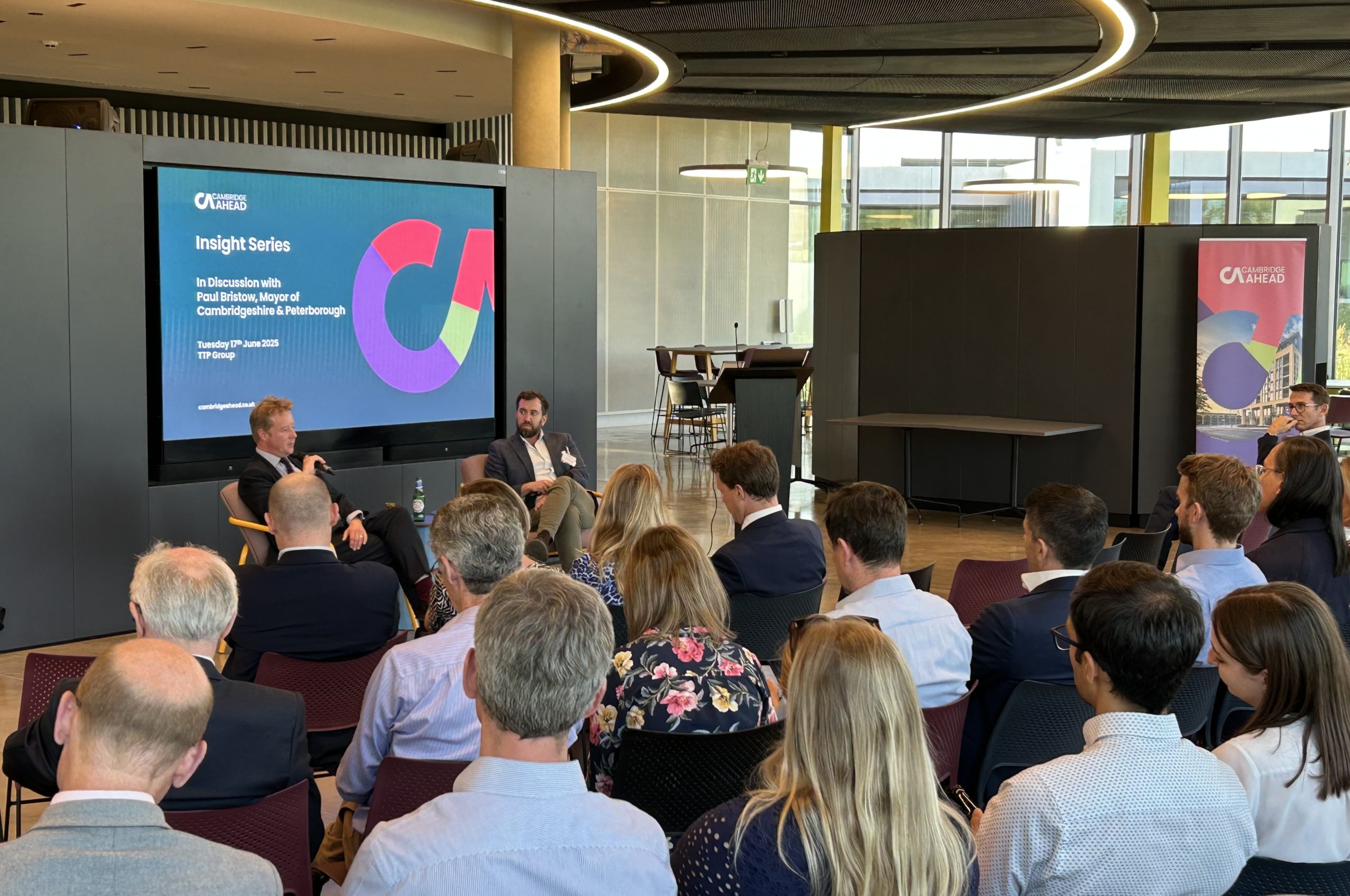A Cambridge Ahead event, held in collaboration with London First and the London-Stansted-Cambridge Consortium considered the options.
Over 100 delegates from business, the public sector and the third sector gathered at Granta Park recently to debate the critical question of how to fund the infrastructure needed to support sustainable growth in Greater Cambridge. The Greater Cambridge area is one of the UK’s economic and housing growth hotspots, and a critical part of both the London-Stansted-Cambridge and the Oxford-Milton Keynes-Cambridge growth corridors.
A panel of experts convened to discuss the issues:
- Dame Kate Barker, one of the UK’s foremost economists and currently a commissioner on the National Infrastructure Commission and Chair of the Cambridgeshire & Peterborough Independent Economic Commission;
- Professor Tony Travers, Director of the London Department of Government at the London School of Economics and advisor to the Select Committee on Education, Housing, Communities and Local Government
- Chaired by Alex Plant, Regulation Director for Anglian Water (and previously Executive Director for Economy, Transport and Environment at Cambridgeshire County Council).
Can Greater Cambridge fund its own future effectively?
Alex Plant’s opening comments highlighted that one of the most difficult issues to resolve is the ability of a fast-growing area to fund the infrastructure required to support its continued growth. At the moment, very little of the growth dividend stays in the local area: currently less than ten pence in the pound is retained locally.
Although the City Deal was a huge step forward for the Greater Cambridge area, it is based on grant funding from HM Treasury. So, how can we become more self-sustaining in the future?
Some of the key points considered and debated, both by the panel and by members of the audience during the subsequent Q&A, included:
Fiscal Devolution:
In Greater Cambridge (and other growing parts of the country) it is currently very hard to capture the growth in tax yield locally. Rather, nearly all of this goes to HM Treasury and decisions on key economic levers are often also made centrally, at least in England.
Rather than decisions being made centrally, it seems more likely that people who live and work in Greater Cambridge would be best placed to make appropriate decisions about the type of growth which is good for the local area, which in turn would create greater total tax revenues, to the benefit the whole country.
It is important to acknowledge that any fiscal devolution would need to be accompanied by assurances that more flexibility for Greater Cambridge isn’t about leaving other areas behind. As part of that discussion it would be important to agree what kind of infrastructure is required across the country and to provide evidence of the fact that if Greater Cambridge was to grow faster than other areas, that it would also be of benefit to the rest of the country too.
This is particularly true of Cambridge, which is recognised as being able to attract investment that would otherwise have gone elsewhere in the world, not just to other parts of the country.
Is tax-raising devolution an option?
This has worked in Scotland and Wales, but it’s important to remember that both these areas have had massive infusions of funding, whereas Greater Cambridge would be a net contributor. However, there were arguments in favour of some elements of tax-raising powers being localised to liberate fast-growing areas to invest in their own growth and also generate additional tax revenues that could be redistributed elsewhere.
Stamp Duty Land Tax?
It was suggested that this option could – in any affluent part of the country – be an effective tax for localisation, which could form part of a broader political settlement. By way of example, the London Finance Commission had the notion of devolving property taxes to London to give an incentive for the city region to get a consistent approach to the combination of taxes. This initiative allows for the rationalisation of the property market and the maximisation of investment in local infrastructure. Could this also be a consideration for Greater Cambridge?
Net Additionality:
A risk in all public policy debates is that there is an assumption of a fixed level of growth for the UK. This issue loomed large in the City Deal discussions and at the time it seemed that the Government’s starting point was to assume that all local growth was displacement from growth that would otherwise have happened elsewhere in the UK, rather than being net additional to the UK.
Whilst better infrastructure would enhance growth across the country, is it not also sensible to assume that targeting specific bottlenecks could unlock additional growth? The current system tends to prefer vast investment in big projects rather than smaller schemes with higher benefit. However, the Eddington Review of Transport Policy (over a decade ago), suggested the opposite, ie don’t look at ‘grands projets’, look instead at a series of smaller schemes – because the big projects can often overlook the community and social dimensions of growth.
Giving local government a stake in the future tax yield for its area would create a real incentive for growth. This was asked for in the City Deal but rejected.
It was suggested that Government may now have a more sympathetic ear and that a case could again be made.
Funding and Governance:
Early work by the Cambridgeshire and Peterborough Independent Economic Review suggests three distinct sub-regional economies: Greater Cambridge, Greater Peterborough, and the rural fens. What does this suggest both for funding solutions and governance structures and how we get the most out of it?
- The panel and audience acknowledged that the Cambridgeshire & Peterborough area is a microcosm of the UK problem. We have a well-to-do city in the south and less well-placed areas in the north.
- It was suggested that there may also be a temptation in government to regard mayoral areas as test beds for experiments in taxation. This approach might work more easily for Manchester or Birmingham but could be much more difficult to implement here.
- Greater Cambridge does not fit the mould of a central city, which links the whole area to the centre. Peterborough has its own vision, including a university. Fenland has a different economy, deeply rooted in agriculture and opportunities within the agri-tech sector, and Cambridge has its own knowledge-intensive based economy. All three tell different stories and require different solutions. Given the emphasis on devolution it is important not to make the mistake of aggregating at the Combined Authority area.
- There is also a clear subsidiarity argument – devolve to the lowest practical level – make the most of existing bodies and recognise and celebrate the difference.
- Greater Cambridge, Greater Peterborough and the Fens, have their own traditions. That could hint towards a federal approach, being consistent in planning, but with a sense of local autonomy.
In closing the debate, Alex Plant concluded that growth of Greater Cambridge can be positive not only for the local area and the wider region, but also for the UK as a whole. However, as the area continues to grow it is essential that we have the necessary tools to allow for that growth to be sustainable, to enhance the quality of life for all, and to nurture continued success.
It is the responsibility of us all to engage with these discussions going forward to enable considered and sustainable growth into the future.




